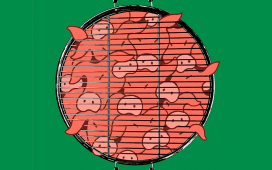Palo santo smudge, vape pen, dead yellow roses on an uneven, wide-plank, wooden floor: welcome to Kaitlin Prest’s Hollywood apartment. When she offers coffee, from a French press, she squeals—Yay!—if you say yes, particularly if you first said no. She wears a white linen blouse and a skirt with pockets, like a farmwife; her hair is curly and dark, and her eyes gleam. Recording her is no problem. She is thirty-three and for more than a decade has been broadcasting the most intimate facets of her sexual, romantic, and emotional life on the radio and on her celebrated Radiotopia podcast, “The Heart.” The Guardian has called “The Heart,” which got more than seven million listens between 2014 and 2017, “poignant, Proustian audio.”
In Prest’s elaborately sound-designed productions, she whispers, self-examines, and confides, blending reënactment with verité excerpts of her real life: we listen as she argues, flirts, makes out. “I wanted to make something that scratches the same itch as a Hollywood movie, but is rife with truth,” she told me. “I asked myself, ‘How do you represent the truth of life?’ Narrative does a pretty good job of reproducing the way it feels. As a storyteller, I’m always asking, How do I tell a story that makes the person listening to it feel the way I felt when that person kissed me? How can I make it feel as exciting? The only answer I’ve come to is to create a narrative structure of tension and release that allows for that kiss in the story to feel like just as much of a surprise as when it happened to you.” She said, “I have a feeling of I have nothing to hide. Literally everything about me is out in the world.”
I first heard Prest on “No,” a startling mini-season of “The Heart” that was presented in the spring of 2017, and later adapted for WNYC’s “Radiolab.” “No” is about consent, and examining the ways women are conditioned to privilege other people’s feelings and desires above their own. Seeking answers to misunderstandings, miscues, and abuses from her past, Prest interviews her parents, female victims of consent violations, and men who admit to having crossed boundaries. (Prest’s father reflects regretfully on a transgression from his adolescence.) Whenever possible, she uses real tape. In one episode, she plays a recording from a sexual encounter with a male friend called Raoul, an ex-partner she was interviewing on another topic. After the formal interview, he asks if she wants a massage. She agrees, and clearly delimits where she wants to be touched and where not. In spite of that, Raoul keeps pushing the encounter toward greater intimacy. She analyzes beat by beat how and why her “no” was heard as “yes,” and why she ultimately permitted the sex that she had set out saying she did not want to have. It is stop-in-the-middle-of-the-crosswalk tape, utterly arresting, disturbing, voyeuristic, raw.
The timing of “No” was prescient, released just six months before the Harvey Weinstein allegations and the ensuing #MeToo moment precipitated a broad, mainstream conversation around issues of gender, sex, and power. In the midst of that renegotiation, Prest has become a voice reporting from the gray zone. “Everyone always asks me, ‘How do I fix it?’ ” she said. “It’s a lifelong journey of ‘How do I know what I want, and how do I know what I want independent of what everyone else wants?’ For women and others in traditional oppressive-power-dynamic things, it’s going to take forever.” She added, “On the other hand, people can just say sorry.”
Prest pronounces “sorry” in the Canadian way. She grew up outside Montreal, in a tiny town called Winchester Springs. Her parents are classical musicians who met at McGill University. There wasn’t much for Prest in Winchester Springs. “It wasn’t cute-upstate-New York rural. It was Bro-land. Either church or hockey or heavy metal,” Prest told me, echoing almost to the word a line from her podcast “The Shadows,” a fictional audioplay that she made with the Canadian Broadcasting Corporation in 2018. She went with the heavy metal, left for Montreal at nineteen, enrolled at McGill and then switched to Concordia, was broke, made art, and did activist street puppetry. In 2006, she fell in with a group of queer feminists and started making a radical anarchist radio show called Audio Smut in a basement radio studio. “Can’t be a filmmaker, ’cause cameras are fucking expensive,” she said. “I was making art out of garbage, because I couldn’t buy a canvas. I’m, like, Oh, my god, brush, no. And theatre as well—I can’t pay for supplies or space. With radio, no materials! The station had a recorder they’d lend out, and they had a studio, and all it takes is a brain. It was so amazing, the theatre of the mind. Because it was a mass medium, there was a built-in audience.”
Audio Smut featured Prest and her friends talking about S.T.D.s and threesomes and the heightened perceptivity that can accompany arousal. She told me, “I wanted to insert people who look like my friends, this community—women! Queers! People of color! I wanted to insert these people into mainstream culture.” The show, which she turned into a highly produced documentary program, was joyfully confrontational. “Audio Smut was a sex-positive, queer, fuck-you show,” she told me. “We’d record ourselves masturbating and put it on the radio, for 6 P.M. drive time.”
Prest turned Audio Smut into a podcast, because her friends didn’t own radios, and she wanted them to hear the radical work she was making. When she arrived in New York, in 2010, she went straight to the offices of WNYC, to express her admiration, not realizing that in New York you need an appointment and an I.D. For four years, while waitressing at Suen Noodle to pay rent, she was told “No, No, No”: her stuff was too political, too feminist, too sexual, not commercial. Nevertheless, she found radio heaven in the city, a pre-“Serial” audio boomtown. When she met Roman Mars, the podcast impresario behind the network Radiotopia, she persuaded him to take her on, changing the name of her show to “The Heart.”








